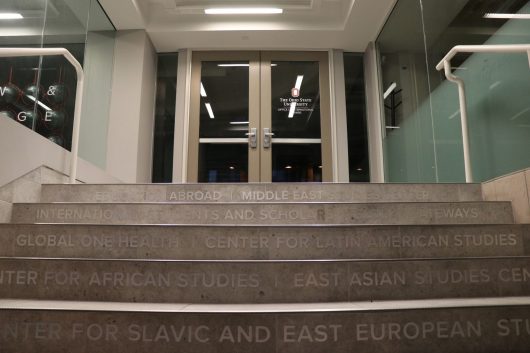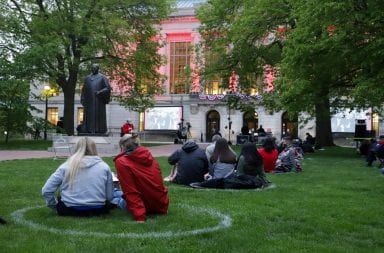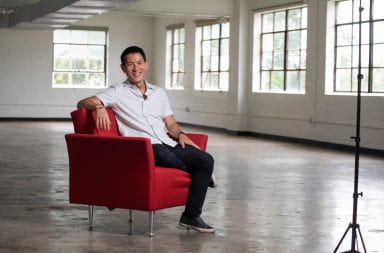
Ohio State Office of International Affairs in the Enarson Classroom Building. Credit: Jack Westerheide | Former Photo Editor
For many students, the uncertainty of whether their fall classes will be in person or online ranges between annoying and stressful. But for international students, one class can make the difference between remaining in the United States and the loss of their immigration status.
The Student Exchange and Visitor Program announced changes to temporary exemptions for international students in a Monday press release. Depending on the school’s status of fall classes, the changes require international students to either take in-person classes or return to their home countries.
Ohio State’s official class status is a “hybrid” model of in-person and virtual guidance, meaning according to the new exemptions, students must take as few virtual classes as possible in order to maintain their F1 student visa status. But because Ohio State will not finalize student schedules until the end of July, according to a Monday universitywide email, students like Victoria Holland, a fourth-year in marketing from Canada, are left wondering if decisions outside of their control will force them out of the United States.
“I was definitely not expecting my immigration status to be affected by this pandemic,” Holland said. “Throughout my time on an F1 visa, I’ve never really worried and I’ve felt pretty secure in the United States, but it’s definitely a really unsettling feeling knowing that my immigration status is now pending based on whether my classes and my professors decide to do in-person or online learning.”
Holland said according to her Buckeyelink account, three of her five classes have been made online. She said the university has not reached out to her regarding the Student Exchange and Visitor Program’s changes.
International students — who made up 10.7 percent of students at the Columbus campus, according to the spring 2020 15th-day enrollment report — have instead been steered toward Ohio State’s Office of International Affairs website, where there is a Frequently Asked Questions page regarding the new exemptions. Included in their recommendations is a link for the Authorized Early Withdrawal Form in the event that students are not allowed in the United States and are unable to take their courses online from their home countries.
Holland said she would easily be able to finish her degree virtually in Canada, but she recognized that not every student is in such a position.
“I know there are students that would go back to countries where WiFi is a luxury, or there are online restrictions with certain websites,” she said.
The university has begun talking with elected officials to articulate their concern for students, University Provost Bruce McPheron said. As of now, no particular plan to encompass the needs of individual students has been made yet, but he said the university is looking at what other universities are doing for guidance.
“We’re working hard to try to reduce that uncertainty to our best ability,” McPheron said. “There may be limits to what we can do.”
McPheron said that although the university will explore different ways for students to continue their education at Ohio State, differing abilities to connect online due to time zones and internet restrictions makes it more complicated.
But unreliable internet access or internet restrictions aren’t the only barriers international students might face.
Manureet Mangat, a fourth-year in finance, said that when she first heard the news of the ICE ban she was “terrified.” Going back to her home country of Canada means saying goodbye to her family — and having no one waiting for her across the border.
“My entire immediate family is here [U.S.], so I would just have to go back alone which is really scary,” Mangat said.
Monday’s Student Exchange and Visitor Program announcement sparked outrage from the university community. Undergraduate Student President Roaya Higazi issued an open letter, signed by “international students and scholars,” Wednesday condemning the change to temporary exemptions and asking for the university to address it.
“We acknowledge the burden and stress being put on the administration due to the pandemic,” the letter reads. “However, our concerns and interests have been put aside for far too long.”
The list of demands includes the creation of one-credit hour in-person classes for international students in order to maintain their immigration status, the inclusion of international students on all task forces and committees related to the pandemic and transitioning of classes, and the offering of most courses in an “online and asynchronous format” so students can complete coursework at their own pace in different time zones.
“International students, among other vulnerable groups, are consistently left out of the narrative and catered to as an after-thought. We refuse to accept this any longer. We will not wait for passive updates. Instead, we need your support, we need you to stand with us, and we need you to advocate for us,” the letter reads. The letter had 3,042 signatures at the time of publication.
Mangat said while other universities, like New York University — whose president issued a statement Wednesday urging the administration to revoke the rule — are providing students with reassurance, Ohio State remains silent.
“I love OSU with all my heart, but it just feels like they’re like, ‘Just wait and see,’” Mangat said. “I just feel like I can’t even look at what my day tomorrow is gonna look like, and it’s really terrifying,” Mangat said.
The Office of International Affairs announced Wednesday it will be hosting virtual information events with immigration coordinators for undergraduate and graduate international students regarding the fall semester.
Holland said that other than being worried about her immigration status, she is frustrated by the lack of control she has in the future of her education.
“I’ve put in a lot of time and effort to achieve an Ohio State degree, and I still hope to to achieve that,” Holland said.
Owen Milnes and Jasmine Hilton contributed reporting.


